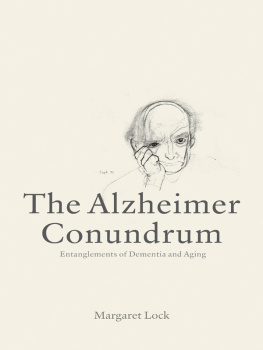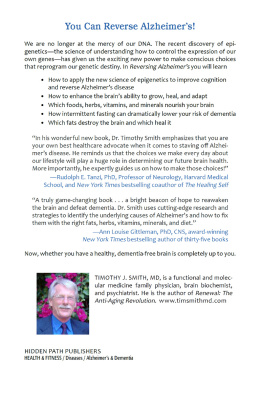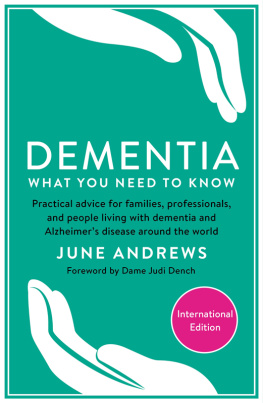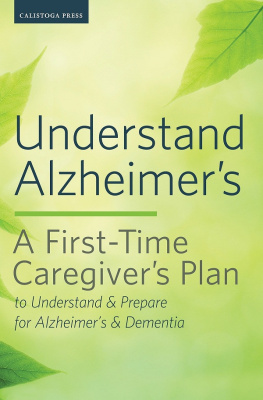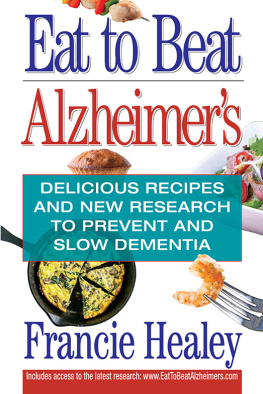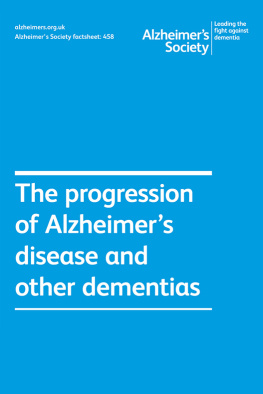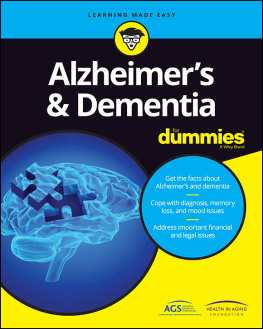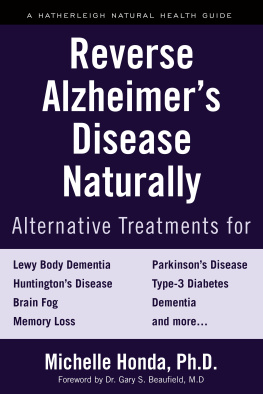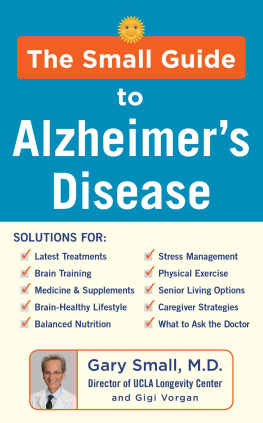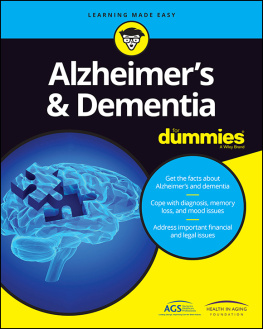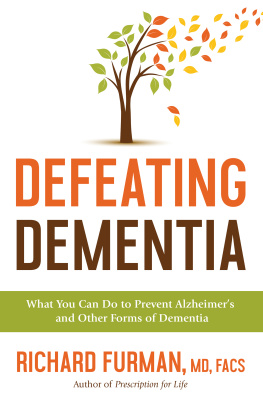
The Alzheimer Conundrum
The Alzheimer
Conundrum
Entanglements of Dementia and Aging
Margaret Lock
Copyright 2013 by Princeton University Press
Published by Princeton University Press, 41 William Street, Princeton, New Jersey 08540
In the United Kingdom: Princeton University Press, 6 Oxford Street, Woodstock, Oxfordshire OX20 1TW
press.princeton.edu
Jacket art: William Utermohlen (19332007), detail of Self Portrait with Cat 1955.
Pencil on paper, 44 x 32 cm. Courtesy of Galerie Beckel-Odille-Bocos, Paris.
All Rights Reserved
Library of Congress Cataloging-in-Publication Data
Lock, Margaret M.
The Alzheimer conundrum : entanglements of dementia and aging / Margaret Lock.
pages cm
Includes bibliographical references and index.
ISBN 978-0-691-14978-3
1. Alzheimers diseaseAge factors. 2. Older peopleMental health. 3. BrainAgingMolecular aspects. I. Title.
RC523.L63 2013
362.196831dc23 2013011850
British Library Cataloging-in-Publication Data is available
This book has been composed in Verdigris MVB Pro Text.
Printed on acid-free paper.
Printed in the United States of America
1 3 5 7 9 10 8 6 4 2
Dedicated to the memory of my parents,
Albert A. Foreman and Anne Foreman
Contents
Chapter 1
Making and Remaking Alzheimer Disease 26
Chapter 2
Striving to Standardize Alzheimer Disease 51
Chapter 3
Paths to Alzheimer Prevention 76
Chapter 4
Embodied Risk Made Visible 100
Chapter 5
Alzheimer Genes: Biomarkers of Prediction and Prevention 132
Chapter 6
Genome-Wide Association Studies: Back to the Future 156
Chapter 7
Living with Embodied Omens 174
Chapter 8
Chance Untamed and the Return of Fate 207
Chapter 9
Transcending Entrenched Tensions 229
Afterword:
Portraits from the Mind 243
Acknowledgments
Without the unstinting donation of time by the many experts in the Alzheimers world to whom I have talked over the past ten years, some of them repeatedly, this book could never have been written. Among those from whom I have learned the most are Howard Chertkow, a neurologist who works at the Jewish General Hospital, part of the McGill University Health Center and Carol Brayne, who is the Professor of Public Health Medicine in the Department of Public Health and Primary Care, Cambridge University. Exchanges often took place while consuming delicious meals prepared in one or other of our respective homes. In addition, many other extraordinarily busy scientists, clinicians, and genetic counselors have given generously of their time to teach me about the world to which the majority have devoted their lifes work. Exchanges with these experts were, inevitably, exceptionally rewarding.
Numerous patients and families readily agreed to meet with my research assistants or myself, often spending up to an hour or more talking with us. These conversations frequently touched on painful subjects, but, even so, virtually everyone insisted that they were only too happy to assist with the research project. Robert Green, Professor of Genetics, Neurology and Epidemiology at Harvard University medical school, made it possible for my research team to meet with research subjects who had volunteered to be part of the REVEAL randomized controlled trial, for which I am very grateful. Involved researchers flew in from several cities in the eastern United States in order to meet with us for a whole day in Boston in preparation for the interviews we would carry out over the following months. Howard Chertkow made it possible for us to meet with patients who were attending a memory clinic in Montral, and Tom Dening, an old-age psychiatrist who resides in the United Kingdom, was kind enough to take me along with him to meet with families in his care living in the vicinity of Cambridge.
Over the years a number of research assistants have worked with me, especially in connection with interviewing families where Alzheimer disease is present and then compiling and analyzing the findings. I have lasting memories of hurtling to Boston and back in a rented car, more than once, in very lively company! Many thanks are due to Janalyn Prest, Stephanie Lloyd, Julie Freeman, Gillian Chilibeck, Briony Beveridge, and Miriam Padolsky. In addition, Gillian Chilibeck, Wilson Will, Adam Finchler, and Kristin Flemons were indispensible in carrying out library research, entering data, preparing PowerPoint presentations, and battling with the odd computer glitches.
The Social Sciences and Humanities Research Council of Canada (SSHRC), the Canadian Institutes of Health Research (CIHR), the Wenner-Gren Foundation, and the Trudeau Foundation provided funding for this research. This generous support ensured that the project could be carried out in Canada, the United Kingdom, and the United States, permitting to some extent comparison of the respective situations in these three countries. It also meant that I was able to delve very deeply into an exceptionally complex problem, one that has taken on an aura of urgency in recent years as the aging of the worlds population and what this implies not only in terms of health care but in addition with respect to the global economy at large are now apparent to all.
I am indebted to the anonymous reviewers of the manuscript who provided certain invaluable comments. In addition, colleagues near and far perused parts of the manuscript and made important suggestions. Among them are Jesse Ballenger, Kenneth Weiss, Sharon Kaufman, Howard Chertkow, Carol Brayne, and Peter Whitehouse. Many thanks go to Fred Appel, the Executive Editor of Princeton University Press, as well as to Sarah David, Jenny Wolkowicki, Jessica Massabrook, and Elizabeth Blazejewski, whose assiduous attention and care throughout have been of the very highest professional standard.
As ever, Richard Lock has been the bedrock of support, master chef, close companion for many decades, critical commentator, and source of inspired exchanges in all manner of situations.
The Alzheimer Conundrum
Orientations
The Epidemic of the 21st Century
We live with a plethora of epidemicsobesity, diabetes, autism, prostate cancer, breast cancer, HIV/AIDS, child abuse, crime, and terrorism, to name a few. Among this multiplication of catastrophes, reports about a proliferating epidemic of Alzheimer disease are increasingly conspicuous in the media.
In his book The Longevity Revolution Robert Butler, gerontologist, psychiatrist, and Pulitzer Prize winner, argues that one of the triumphs of the 20th century has been the dramatic increase in the numbers of people who live to old age, but he quickly adds that this has brought about an increase in the number of individuals suffering from dementia. Unless we find ways to prevent or cure Alzheimers and other severe dementing diseases, Butler argues, the world will shortly be confronted with the epidemic of the 21st century.
Use of the term epidemic has a long history, from the time of Homer or earlier, but its meaning has changed over the years.
Since the condition was first formally named as a disease in 1908, repeated efforts have been made to delineate with ever more accuracy the clinical and neuropathological features of Alzheimers, with the ultimate objective of finding a cure. However, despite many billions of dollars poured into research over the past several decades, no cure has been found, and, at present, only four drugs are available by prescription that variably alleviate symptoms for a period of some months, often with side effects, and by no means in all patients. It is perhaps not surprising, then, given the projected increase in the numbers of people who will become demented in the coming years that a move is under way in the Alzheimer world to implement research designed to bring about the
Next page
